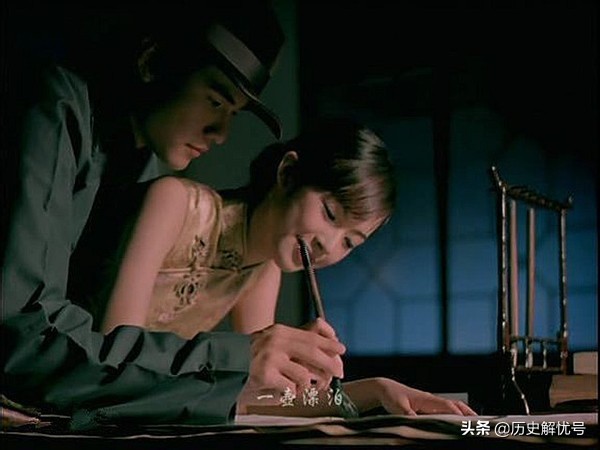
Who is playing a song with a lute to break the east wind
Years peel off on the walls to see when I was a child
I remember that we were all very young
And now the sound of the piano is quiet, and I have not heard you waiting
Maple Leaf dyes the story to the end and I see through it
I lead you through the ancient road outside the fence
In the years of the smoke and grass, even the breakup was silent
- "East Wind Broken"
"Dongfeng Broken" was included in Jay Chou's album "Ye Huimei" in 2003, due to the popularity of tracks such as "In the Name of the Father" and "Sunny Day", this slightly gentle Chinese style song seems to have been suppressed a lot of limelight, but what many people don't know is that "Dongfeng Broken" has created the history of Chinese pop music.
It is the pioneering work of the "three ancient and three new" Chinese style, that is, ancient words, ancient culture, ancient melody, new singing method, new arrangement, new concept, and is the originator of the most standard Chinese style song, which is of landmark significance.
Before the release of "Dongfeng Broken", the original Chinese style songs in the domestic music scene were rare, but after "East Wind Broken", Chinese style songs sprung up like mushrooms, so that the situation of today's Chinese style prevailed. It can be said that it has led the glory of Chinese style.
Another unknown place about "East Wind Breaking" is the origin of its name. Fang Wenshan's lyrics skills naturally do not need to be questioned, but these three words are not imagined out of thin air, but the sentences he uses from a Su word. This poem is the "Butterfly Love Flower Kyoguchi Dexiang Book":
Spring is more beautiful after the rain. Only away from people, hatred will never be washed away. Water on three sides in front of Beigu Mountain. Bi Qiong combs the green snail bun.
A piece of paper comes from a thousand miles. Ask me what year I am, it's a real success. Bai Shou sent Chun To get drunk. The east wind blew through a thousand lines of tears.
In 1074, Su Shi, who had previously served as the general judge of Hangzhou, was ordered to go to Changzhou, Suzhou and other places to carry out disaster relief work, and when he arrived in Runzhou, Su Shi received a letter from his hometown, and his family greeted him with courtesy and asked him about his return date. However, the return date was far away, and Su Shi could not control his homesickness at once, so he wrote this poem with a stroke of his pen.
Although this word is slightly unpopular, it also does not lose the level of Su words. The opening chapter shows the scenery after the rain, which has two meanings, one is that the spring is beautiful, especially after the rain, it is more manly, Su Shi describes such a wonderful scenery not for appreciation, but to reflect the "resentment of people" in the following text, which is to set off the mourning for the scene; second, the rain can wash away a lot of things, and even wash out another look of spring, but it cannot wash away the sorrow of leaving people.
Afterwards, Su Shi continued to describe the scene of Music, beigu mountain surrounded by water on three sides, and the curved river surface echoed with the verdant peaks, as if it were a jasper comb, as if it was a beautiful bun. This fresh and beautiful picture of the spring scenery not only did not bring comfort to the author, but made him more and more sad, evoking his infinite nostalgia - although the landscape is beautiful, it is not the hometown after all.
In the next film, Su Shi begins to portray nostalgia positively. All this happened and the word came about because "a piece of paper township book comes from thousands of miles", if the letter is just a cold greeting, talk about home, but once the other party asks about the return date, this matter enters the real problem: can not return, how to return to the period? But how do you get back to your family? Anyway, it's bound to be sad.
Helpless. You can only drink and get drunk," Bai Shou sent Chun To get drunk. The east wind blew through a thousand lines of tears. There are two meanings here: First, Su Shi and Chun are drunk, which shows loneliness, but only Chun is more affectionate and can help him wipe away the homesick tears of that line; second, sending Chun away means that the time is far away, su Shi hopes that time will go faster, so that the return date will be closer.
In the last two sentences, Su Shi did not directly answer the matter of returning, but suddenly turned, and the pen edge came to the top of the drink, and the nostalgia overflowed into words. This kind of unanswered answer is more artistically appealing than the direct answer, which can make people fully feel his boundless sorrow, of course, in the creative point of view, it is also more important to see the writing standard and artistic foundation.
"East Wind Broken" is used from "the east wind blows through a thousand lines of tears", but Su Shi broke the tears of homesickness with the east wind, while Fang Wenshan used the east wind to break the tears of lovers' parting. Perhaps because of this, many people do not understand after listening to this song: why does the wind break? In fact, it is not the wind itself that breaks, but the wind that breaks the tears.